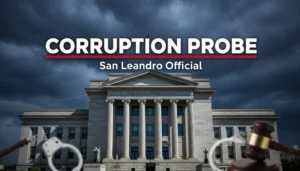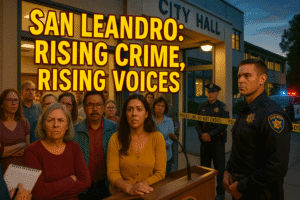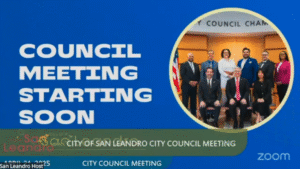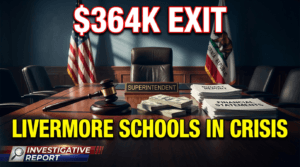East Bay Leaders Sound Alarm: “This is a Republican Shutdown” as Federal Crisis Enters Fourth Week
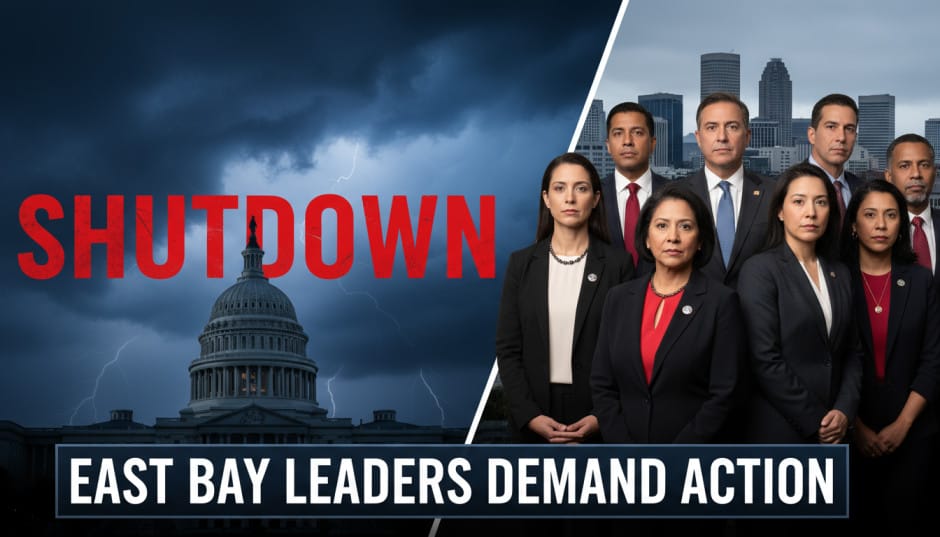

Congresswoman Lateefah Simon and seven Alameda County mayors unite to demand action as thousands face financial hardship and critical services hang in the balance
As the federal government shutdown enters its 24th day—making it the second-longest in U.S. history—the human cost is becoming increasingly clear in the East Bay. On a crisp Friday afternoon in Oakland, Rep. Lateefah Simon stood alongside seven mayors from her congressional district to deliver a stark message: thousands of their constituents are suffering, and it’s time for Republicans to end what they’re calling a “manufactured crisis.”
The unprecedented coalition of local leaders, representing Oakland, Berkeley, Alameda, San Leandro, Emeryville, Albany, and Piedmont, painted a picture of mounting desperation as federal workers face their fourth week without pay and vulnerable residents risk losing critical benefits that keep food on their tables and roofs over their heads.
The Human Toll of Political Gridlock
“I want you to know that this is, in fact, a Republican shutdown,” Simon declared, her voice cutting through the autumn air as she addressed reporters outside Oakland’s federal building. “While the Democrats continue to hold the line for the people of this country, the Republicans continue to not answer the call.”
The numbers tell a sobering story. Of the 760,000 constituents in California’s 12th Congressional District, 10,000 are federal workers who have been working without pay since October 1. These aren’t just statistics—they’re TSA agents at Oakland International Airport, court clerks at the federal courthouse, and countless other public servants who keep essential services running.
Oakland Mayor Barbara Lee highlighted the ripple effects spreading through her city. “The government shutdown has left thousands of employees working at the federal building, the federal courthouse, and the Oakland International Airport without pay,” she explained. The impact extends beyond individual paychecks to entire communities, with concerns mounting about Oakland’s Head Start centers, which serve up to 600 children in under-resourced neighborhoods and rely entirely on federal funding typically distributed on November 1.
Food Insecurity Crisis Looms Large
Perhaps no issue weighs more heavily on local leaders’ minds than the potential cuts to the Supplemental Nutrition Assistance Program (SNAP). In Alameda County, the statistics are staggering: one in four residents experiences food insecurity, and 175,000 people depend on SNAP benefits to feed their families.
“We already know who’s going to be hurt the most by the shutdown—it’s the people who have already been suffering in our community,” said Berkeley Mayor Adena Ishii, her words reflecting a frustration shared by her colleagues. “We need to step up as a community to make sure that we’re continuing to serve people and their basic needs.”
Emeryville Mayor David Mourra painted a vivid picture of the impossible choices families face: “As people are unable to buy food, they might not be able to make rent, because they have to start making painful choices.” It’s a domino effect that threatens to destabilize entire communities already struggling with the Bay Area’s high cost of living.
Healthcare at the Breaking Point
The shutdown’s impact extends far beyond immediate financial hardship. Simon warned that President Trump’s “One Big Beautiful Bill”—which extends tax cuts primarily benefiting wealthy Americans while slashing healthcare spending—threatens to strip healthcare coverage from 15 to 17 million Americans nationwide, including 30,000 residents in her district over the next decade.
Alameda Mayor Marilyn Ezzy Ashcraft expressed deep concern about the regional healthcare system’s ability to absorb the shock. “As people start to lose their healthcare subsidies, or those subsidies become unaffordable, they will turn to hospital emergency rooms as their primary care providers, further burdening that system,” she explained.
This scenario is particularly troubling in the Bay Area, where hospitals are already stretched thin and emergency rooms serve as safety nets for the uninsured. The prospect of thousands more residents losing coverage could push an already fragile system to its breaking point.
Local Leaders Step Up as Federal Government Steps Back
Faced with federal inaction, local officials are mobilizing their own resources. Each mayor at Friday’s press conference confirmed they’re coordinating closely with Alameda County to ensure food banks remain fully stocked and that distribution networks can reach those most in need.
But local resources have limits, and mayors acknowledge they can’t fully replace federal programs designed to serve millions. The coordination represents both admirable community spirit and a troubling indication of how far the federal government has abdicated its responsibilities.
A Call for Leadership Over Politics
San Leandro Mayor Juan González delivered perhaps the most pointed critique of the political dynamics driving the shutdown. Directing his comments toward House Speaker Mike Johnson and other House Republicans, González described the situation as “created chaos” and implored leaders to return to the negotiating table.
“Compromise is not a sign of weakness; it’s a sign of leadership,” González said, his words carrying the weight of a community watching its most vulnerable residents suffer for the sake of political theater.
The mayor’s message reflects a broader frustration among local officials who deal daily with the practical consequences of federal dysfunction. While politicians in Washington engage in blame games and political posturing, mayors and city councils must find real solutions for real people facing real hardships.
The Broader Political Context
The current shutdown stems from a familiar pattern of political brinksmanship, with Republicans and Democrats blaming each other for the impasse. Democrats have refused to support funding measures unless Republicans address potential spikes in health insurance premiums and prevent cuts to Medicaid—positions that reflect their commitment to protecting vulnerable populations.
Republicans, meanwhile, have pushed for funding measures tied to broader policy changes, including immigration enforcement and healthcare modifications that Democrats view as harmful to their constituents.
This dynamic has created a standoff that shows no signs of immediate resolution, leaving federal workers and benefit recipients caught in the crossfire of partisan politics.
Beyond the Shutdown: Immigration Concerns Persist
Friday’s press conference also touched on another source of community anxiety: the Trump administration’s threatened immigration enforcement operations in the region. While Mayor Lee reported that a planned “surge” operation had been canceled, she cautioned residents to “stay vigilant” given the administration’s track record.
The specter of large-scale immigration raids adds another layer of stress for communities already dealing with the shutdown’s effects. Many residents fear that seeking help for basic needs like food assistance could expose them or their family members to immigration enforcement—a chilling effect that could worsen the very problems local leaders are trying to address.
Looking Forward: The Need for Federal Action
As the shutdown drags on, the East Bay coalition of leaders represents a growing chorus of voices demanding federal action. Their bipartisan message—focused on human needs rather than political scoring—offers a model for how elected officials can prioritize constituents over partisan advantage.
The mayors’ coordination on food distribution and other emergency measures demonstrates the power of local government to respond to crisis. But it also highlights the limitations of expecting cities and counties to fill gaps left by federal dysfunction.
The Path to Resolution
The solution to this crisis lies not in Oakland or San Leandro, but in Washington, D.C., where elected officials must choose between political posturing and public service. As Simon and her mayoral colleagues made clear, the human cost of continued gridlock will only grow with each passing day.
Their message to federal lawmakers is simple: end the manufactured crisis, restore essential services, and remember that behind every statistic is a family struggling to make ends meet. In the East Bay, local leaders are doing their part. Now it’s time for Washington to do theirs.
The question remains whether federal officials will heed the call from communities across the nation or continue to prioritize political advantage over public welfare. For the 760,000 residents of California’s 12th Congressional District—and millions more across the country—the answer can’t come soon enough.




